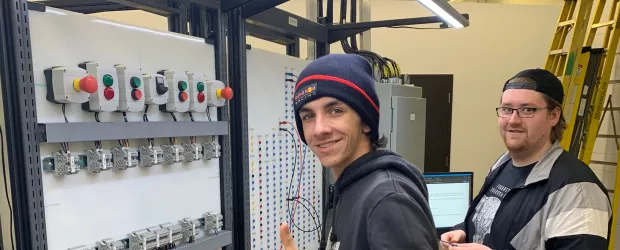Start Dates & Ontario Colleges Program Codes:
- Fall Start (September): 0316
- Winter Start (January): 0328
CIP Code: 15.0303
Powering the Future: Innovate, Connect, and Transform with Electronics
Embarking on a journey to master the fundamentals of electronics is more than just learning circuits and components—it’s stepping into the future of innovation.
From designing groundbreaking electronic products to revolutionizing the telecommunications industry with cutting-edge fibre optics, wired, and wireless connectivity, your knowledge will shape the world.
Every great invention, from smartphones to satellite communications, started with a deep understanding of electronics. By immersing yourself in this field, you have the power to drive technological advancements that connect people, improve lives, and push humanity forward.
The world needs innovators—are you ready to be one of them?
Is Electronics Right for Me?
If you’re interested in how things work—whether it’s troubleshooting a device, setting up new equipment, or fixing something that isn’t working quite right, perhaps taking that interest further by studying electronics in the Electronics Engineering Technician program at Confederation College is the right path for you!
The electronics industry is growing fast, and technicians play a huge role in keeping systems running. It’s not just about designing new tech—someone must install, service, and maintain all the equipment that industries rely on every day. That’s where electronics technicians come in.
Where Can This Career Take Me?
Hands-on Work with Advanced Technology
- Electronics are everywhere, from smart home systems to industrial automation. As a technician, you’d be the one setting up, maintaining, and troubleshooting this technology.
- Instead of sitting behind a desk all day, you can be working with your hands, diagnosing issues, and making sure everything runs smoothly.
The Internet of Things (IoT) is Changing Everything
- More and more devices are connected to the internet—security systems, manufacturing equipment, even home appliances. Technicians are needed to install and service this growing network.
Green Technology and Sustainability
- Energy-efficient systems and eco-friendly electronics are becoming more common, and companies need technicians to install and maintain them properly.
- There’s also a big push for e-waste recycling, which means new opportunities in repairing and refurbishing electronics instead of replacing them.
Networking and Communication Systems
- With 5G expanding and 6G on the horizon, more industries will need technicians to set up and maintain communication systems.
- Wireless networks, fiber optics, and satellite-based internet will all require skilled workers.
Job Security and Demand
- Every industry relies on electronics, so electronics technicians will always be needed—whether it’s in healthcare, manufacturing, telecommunications, or security systems.
- Skilled technicians are in demand, and this program leads to stable, well-paying jobs.
If you like the idea of working with technology, solving problems, and keeping things running. The Electronics Engineering Technician program is a great way to build a career in a growing industry. Whether it’s installing security systems, maintaining manufacturing equipment, or troubleshooting high-tech systems, this field is full of opportunity.
Now, you just need to decide—is this the right path for me?
What About Academic Continuation?
If you're thinking about taking your education even further, the Electronics Engineering Technician program at Confederation College opens doors beyond graduation. As a graduate, you’ll be eligible to enter the engineering stream at Lakehead University, giving you the opportunity to build upon your hands-on technical skills and work toward an engineering degree. This means you can start your career sooner with a strong foundation in installation, servicing, and maintenance—then, if you choose, take the next step into advanced engineering studies. It’s a great way to combine practical experience with higher education, expanding your career opportunities in the fast-growing electronics industry!
Top Highlights
- Learn how to install, interconnect, configure, implement, and troubleshoot network systems
- Work with hardware wiring centres, routers, voice network hardware
- Two optional Co-ops give you a work experience in the field
- Subsidized education program available
- Option to transfer to the Electrical Engineering Technology program at the beginning of Year 2
Program Learning Outcomes
The graduate has reliably demonstrated the ability to:
- Analyze, interpret, modify and prepare electrical and electronics drawings, layouts and reports, with guidance as required.
- Analyze and solve routine technical problems related to electronics engineering by applying fundamental concepts of mathematics and science.
- Apply appropriate troubleshooting techniques to electronic circuits or systems and perform test procedures.
- Assemble, modify, test and troubleshoot electronic circuits, equipment and systems in accordance with job requirements, functional specifications and relevant standards, with guidance as required.
- Maintain and repair electronic equipment and systems in accordance with relevant operational guidelines.
- Provide justification for the purchase of electronic equipment, components and systems in accordance with code, standards and job requirements, and functional specifications.
- Analyze and troubleshoot logic and digital circuits, as well as embedded microprocessor-based and microcontroller-based systems, including assembly and high-level language programs.
- Analyze and troubleshoot circuits consisting of passive components by applying appropriate measurement techniques.
- Analyze and troubleshoot circuits consisting of low power, high power, active and electromechanical components, and analog integrated circuits.
- Analyze and troubleshoot control systems.
- Troubleshoot, maintain and repair analog and digital communication systems.
- Apply relevant shop practices in compliance with safety policies and current regulations for electronics engineering workplaces.
- Assist in implementing and conducting quality control and quality assurance programs and procedures.
- Complete work in compliance with relevant legislation, established standards, policies, procedures and regulations, and ethical principles.
Graduates of the program can also write for various certifications including Microsoft Certified Professional (MCP) certification, COMPTIA A+, and Net+.

Graduates of the electronics engineering technician program have been successful in roles related to:
- Building Automation and Controls
- Industrial and Commercial Communications Systems
- Telecommunications systems
- Industrial Systems Technician
- Engineering Firms
- Electronics Design
- Electronic Repair and Maintenance
- Database Technician
- IT Support Specialist
- Security Systems Specialist
- Network Installation and Maintenance Technician
Employers of Our Graduates:
- Alstom
- Bell Canada
- CRC Communications
- Digital Engineering
- DSP Mining Services
- Elis Don
- Enbridge Gas
- Honeywell
- Hydro One
- Impala Canada
- Johnson Controls
- NAV Canada
- Ontario Power Generation
- Prairie Mobile
- Spectrum Group
- TBay Tel
- Thunder Bay Xerographix
…and many more!
Graduates of this program are eligible to enter the engineering stream at Lakehead University to complete an advanced diploma in technology (one additional year) and continue on toward an engineering degree.











